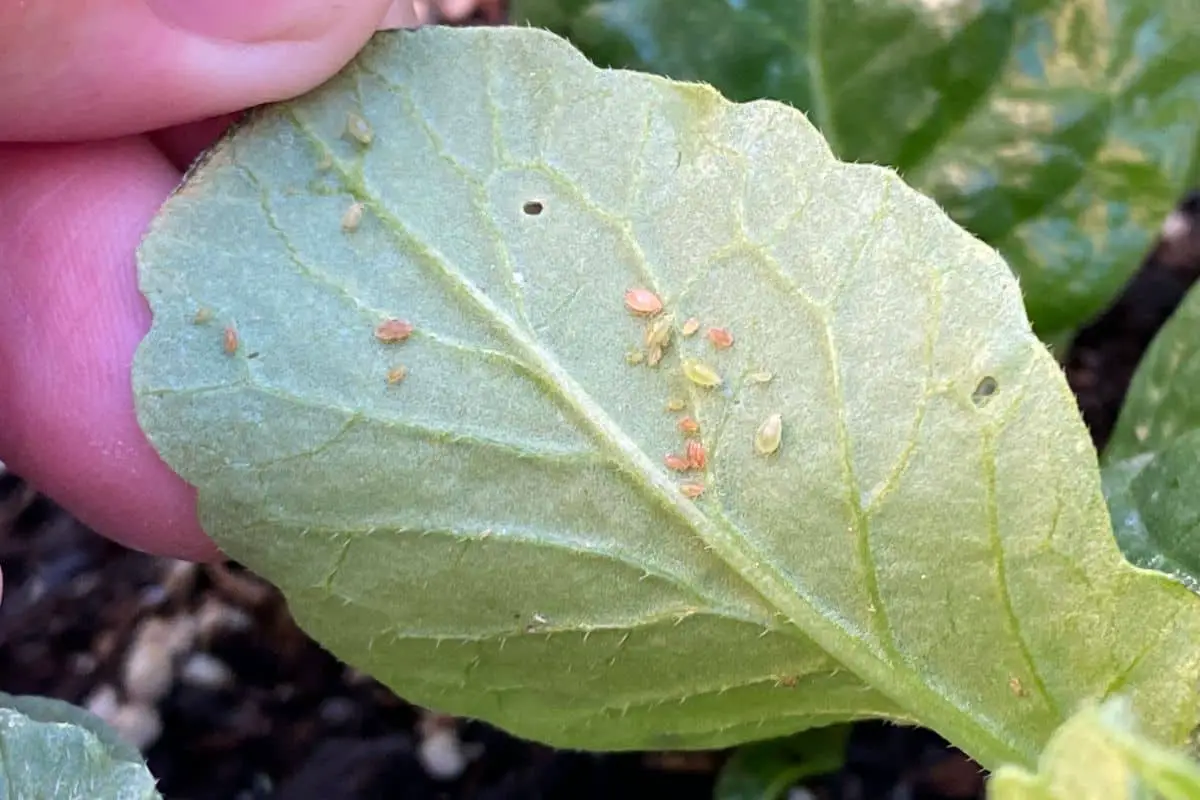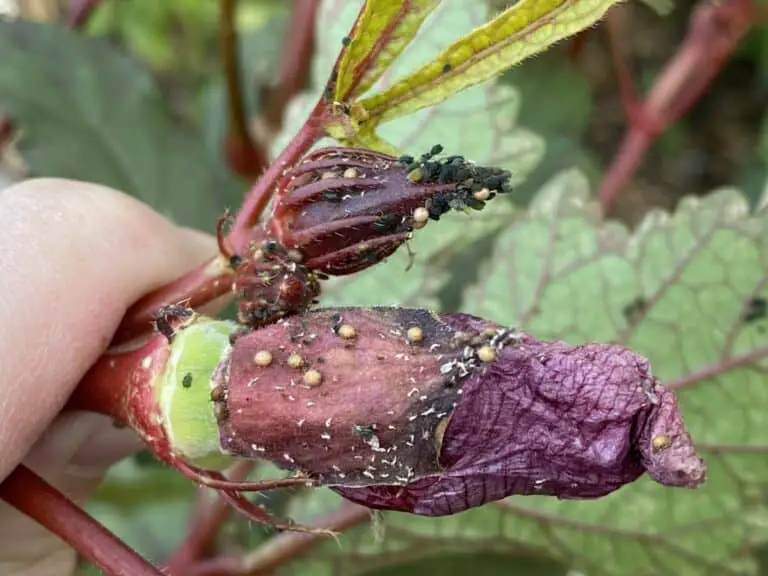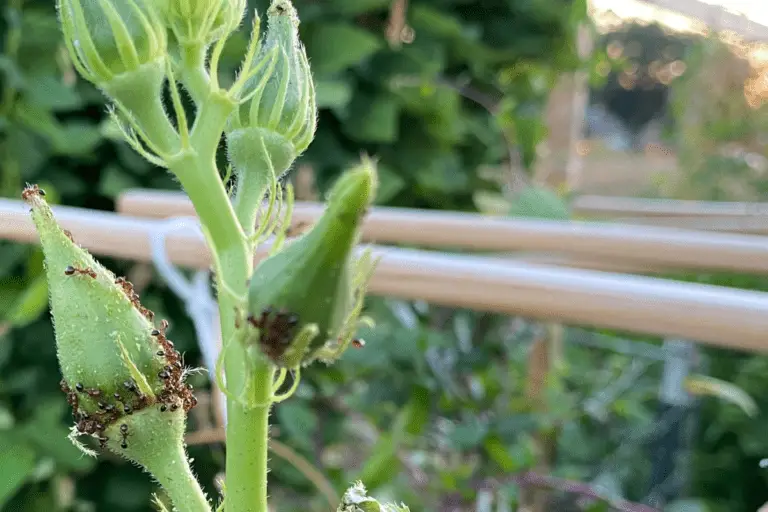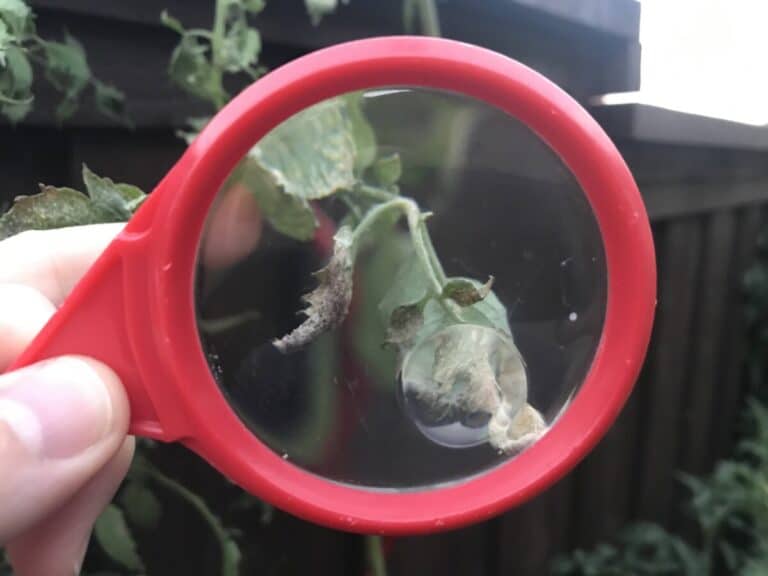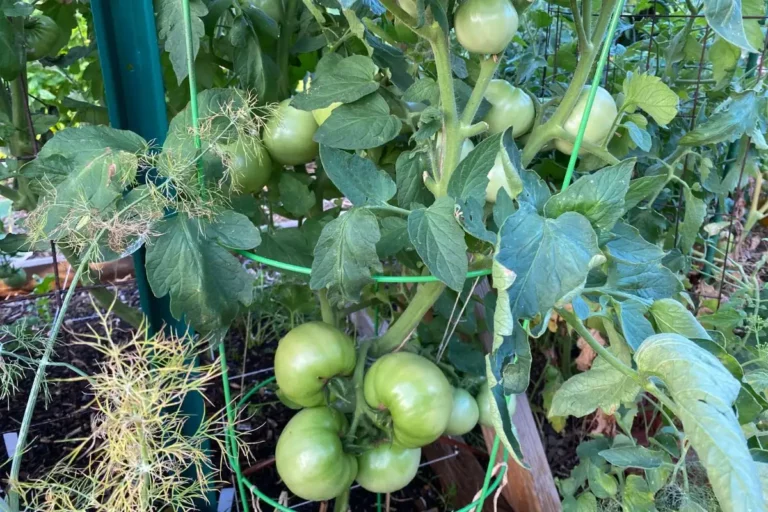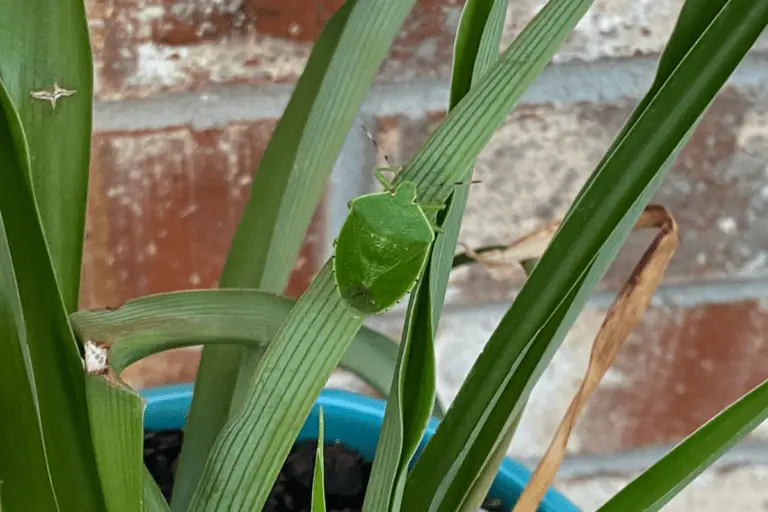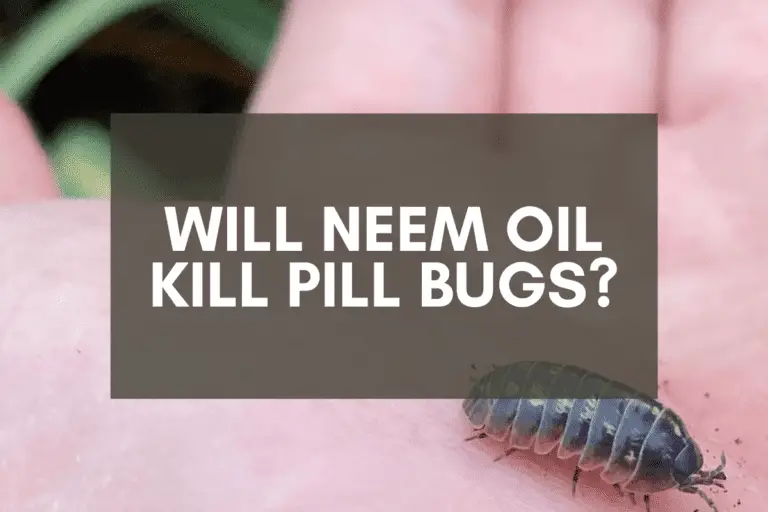Will Aphids Go Away on Their Own? 9 Things to Know
If you’ve got aphids in your garden, you might be wondering whether you should intervene or just leave them alone.
If you do nothing, will Mother Nature help you out? Will those aphids just go away on their own?
Aphids will sometimes go away on their own due to the arrival of beneficial predators, the depletion of available host plants, or the arrival of wintry weather. But as a general rule, leaving aphids alone is risky since infestations can spiral out of control, resulting in widespread plant damage.
I’ve seen various gardening bloggers recommend a leave-them-alone approach when it comes to aphids. I’ve even heard that sentiment from a few of my gardening acquaintances.
But in general, I disagree with this approach because it leaves too much up to chance.
I’ve ignored a few aphid infestations alone over the years to see what would happen, and the results were never that great, as I’ll explain in more detail below.
Long story short, if you’ve noticed an aphid infestation in your garden I think you’ll want to consider 9 things before you decide to leave those aphids alone.
Once you read the details below, you’ll be well aware of the risks involved in ignoring aphid infestations, so you can make an informed decision about whether to leave the aphids alone or intervene to stop them.
So You Want to Leave Aphids Alone? 9 Facts to Consider
Over the past few years, I’ve read literally dozens of scientific articles about aphid biology and morphology, life cycles and reproductive patterns, and pest management experiments and methodologies.
As a gardener, I despise these annoying little pests, but I have to give credit where credit’s due: Aphids are an incredibly resilient, adaptive species.
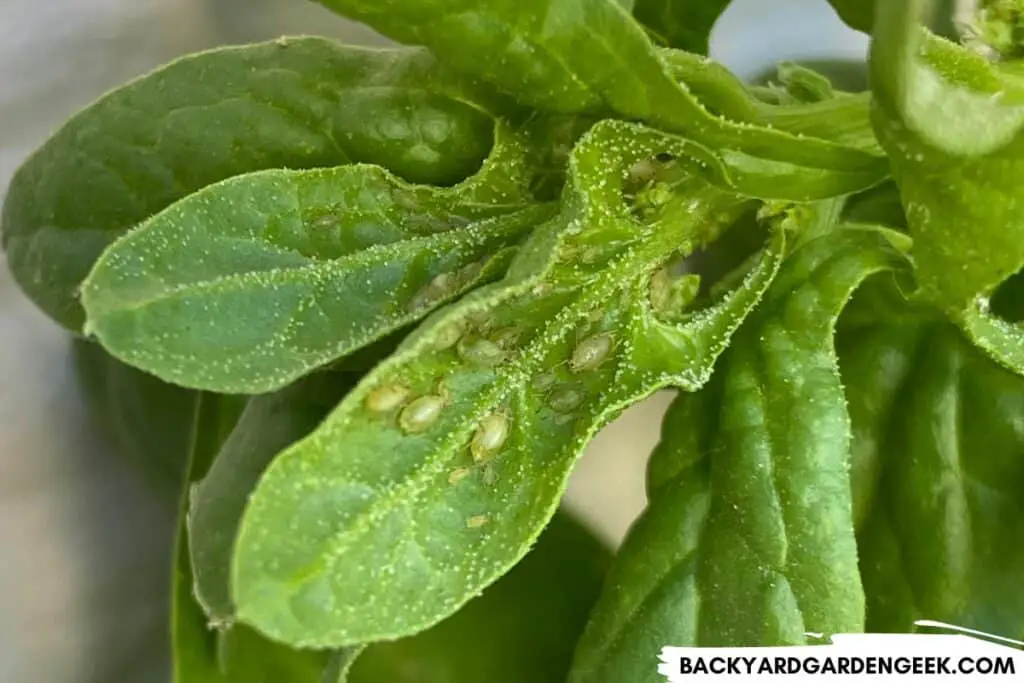
The more I’ve learned about them, the more wary I am of letting them run amok in my garden.
With that in mind, here are 9 things you’ll want to consider before assuming that the aphids in your garden will just go away on their own.
1. Aphids Seek Out Particular Host Varieties
As a general rule, aphids are bad news for your garden. They’ll often arrive without notice and easily spread from plant to plant if they find the right varieties in your garden.
With nearly 5,000 species spread across practically the entire Earth, aphids come in all kinds of sizes and colors.
I’ve written about black aphids, green aphids, red aphids, white aphids, and yellow aphids, but when I was doing research for all of those articles, I was struck by how different kinds of aphids tended to have distinct preferences for different plant species.
I’ve cataloged 21 plants that aphids love to feed on in another article, but overall, aphids tend to enjoy many of the most popular garden varieties, although certain species will prefer some plants over others.
Long story short, you’ll never notice them when they first arrive in your garden, but aphids are adept at seeking out preferred host plants. As soon as they find the right kind of plant, they’ll hide out among its leaves, begin feeding on its phloem sap, and reproduce quickly.
2. Windy Days Will Aid Aphid Invaders
There are many reasons why aphids keep coming back to your garden, but one of the easiest ways they do so is by simply taking advantage of the wind.
What’s amazing about aphids is that you won’t typically see winged aphids. When you find clusters of aphids on your plants (which you can see easily once you know what to look for), they’ll appear quite small.
They’ll be visible to the naked eye (although easier to see if you use a cheap magnifying glass) as little roundish bugs with tiny legs and little pointy things known as cornicles sticking out of their backsides.
But every once in a while, you might notice an aphid with wings. What that means is that the aphids have recognized that their host plant is not ideal for the continuation of the colony. At that point, female aphids will produce winged versions of themselves that have the ability to leave the original host plant, fly up into the air, and ride the wind to other areas in search of new host plants.
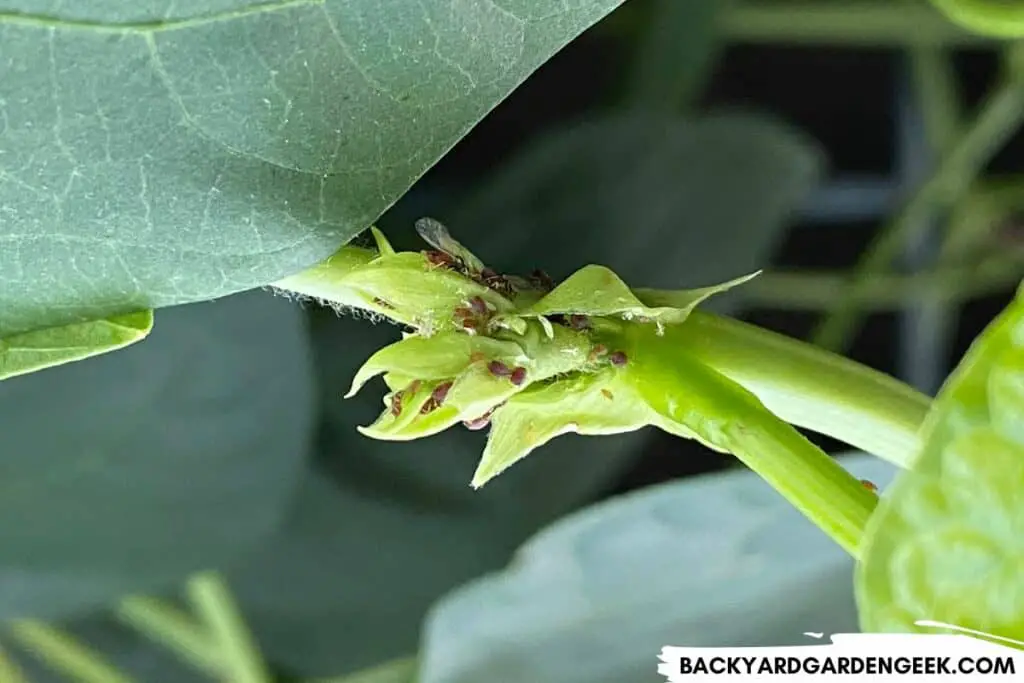
Aphids aren’t the best flyers–which is why they’re sometimes referred to as weak or clumsy flyers–but they don’t need to be the best. They just need to be good enough for the wind to do the work for them.
This means that aphids can arrive on your property at any moment. In fact, you might have several different species of aphids among your plants at the very same time, depending on what you’re growing this season.
So even if you leave aphids alone, there’s no guarantee that they’ll just disappear. And even if they do disappear, nothing’s stopping another aphid species from arriving and causing further plant damage.
3. Aphids Can Adapt to Local Environments
Unfortunately for us gardeners, aphids have adapted to ensure their survival across most of our planet from subtropical regions to arctic environments.
In any given year, aphid colony mortality rates are usually quite high (anywhere from 80-85%), but the aphids that survive end up reproducing themselves the following year and starting the cycle all over again.
But aphids have not only adapted to individual climates. They’re also involved in an ongoing evolutionary war against plants.
You see, plants have complex defense mechanisms against pests like aphids. But aphids will adapt to overcome plant defenses. And all of this is taking place at the molecular level.
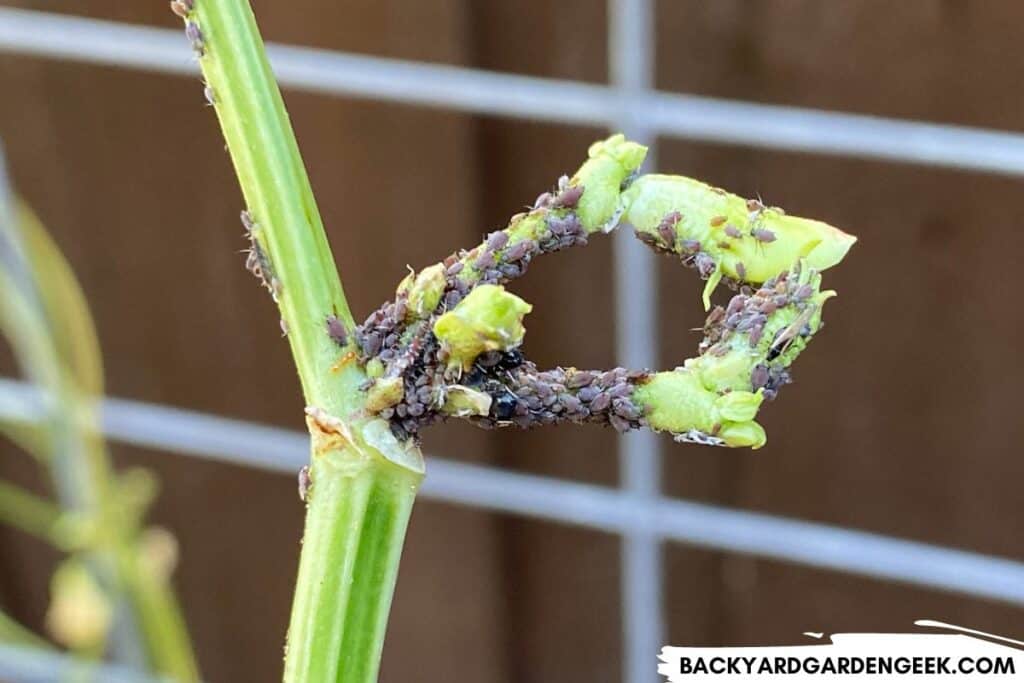
Long story short, aphids don’t typically go away on their own unless external environments–such as predators, plant resistance, or host plant damage–force them to relocate in search of better food sources.
4. Plants Have Some Natural Defenses
As I just noted, plants have natural defense mechanisms that they activate when faced with external threats: aphids, armyworms, spider mites, stink bugs, and other bugs that feed on plants or plant sap.
Of course, these mechanisms aren’t sufficient to keep away all nasty pests–which is why you’ll find invasive bugs in your garden this year–but healthy, thriving plants can withstand infestations much more than plants that are nutrient deficient or that don’t get consistent enough waterings.
This is why spider mites often show up when summer temperatures place a strain on certain plant varieties. In their weakened state, the plants are more susceptible to attack since they don’t have the ability to fight back when pests begin feeding on them.
Can plants recover from such attacks? Yes. But it usually requires some intervention as well, whether that’s in the form of soapy water sprays, neem oil treatments, or other insecticidal applications.
Long story short, your plants will be better equipped to fend off aphids if they’re in tip top shape in terms of soil health and watering frequency, which means there’s a small chance that aphids might go away on their own if your plants’ natural defenses are up to the task and aren’t outwitted by aphid adaptations.
5. Beneficial Predators Will Target Aphids
The most common reason for aphids to disappear on their own is the arrival of beneficial predators in your garden: ground beetles, hoverflies, lacewing larvae, ladybugs (both larvae and adults), parasitic wasps, and soldier beetles.
I love it when I see these bugs in my garden, but sometimes you won’t see the predators at all, only the results of their predation.
For instance, if you notice tannish, bloated aphids on your plants, those aren’t actually aphids (any longer). They’re aphid mummies.
What’s happened is that parasitic wasps noticed your aphid infestation, then laid their eggs in your aphids. As the eggs developed, the growing larvae ate the aphids from the inside out, leaving their hollowed out shells clinging to your plants.
This is a sign that you’ve got good bugs mixed among the bad in your garden, which means you need to be extra careful when spraying your plants with soapy water, neem oil, or other treatment methods.
Ladybugs and lacewing larvae are also adept aphid devourers. You can buy them from online retailers and release them in your garden, but they’ll often show up on their own once they detect an infestation.
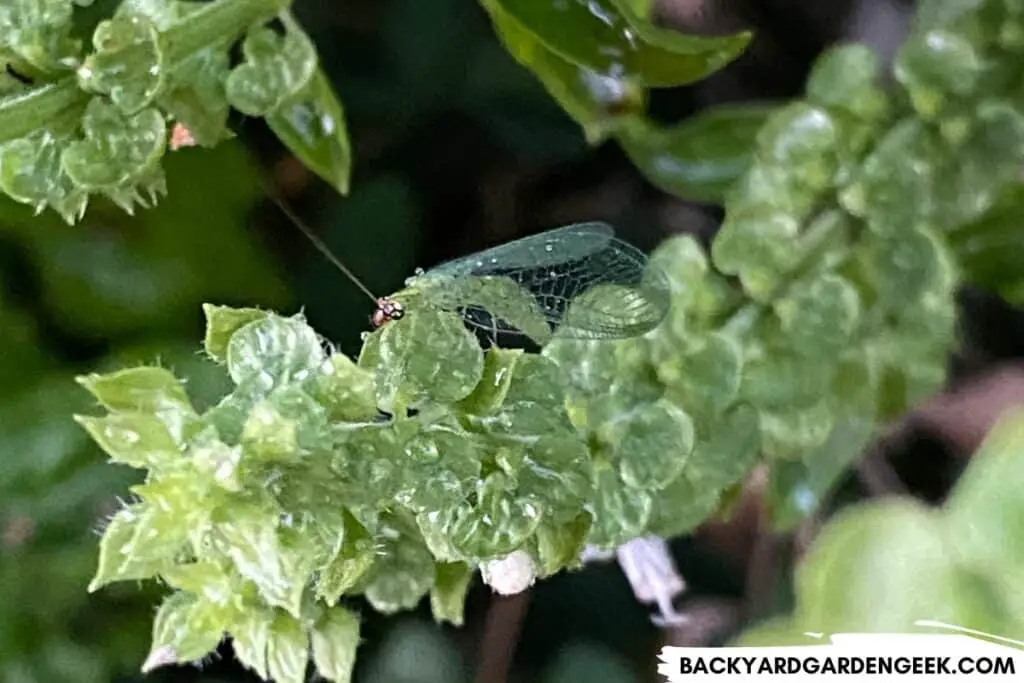
Unfortunately, there are 2 downsides to relying on beneficial predators to take care of your aphid problem:
- Those predators might not show up very quickly. When they do, they might not arrive in sufficient numbers to make your aphid problem go away on its own.
- The predators will only hang around while there’s an available food source. Once that food source disappears, those bugs will move elsewhere in search of more food.
I saw both aphids and ladybugs among my spinach a few years back, and I left them all alone to see what would happen. Unfortunately, the aphids proliferated despite the presence of ladybugs, and I had to intervene to keep them from destroying all of my spinach plants.
On another occasion, I was fortunate enough to see a ladybug grab an aphid and begin munching on it. What surprised me most was how long it took her to eat the aphid (approximately 7 minutes). When she was done, she must have been temporarily full because she walked right by many other aphids and didn’t seem to care one bit about them.
But last season, something different happened when aphids showed up on my yardlong bean plants. Within a few weeks, tons of ladybugs showed up as well. They didn’t get rid of the aphids entirely, but they put a huge dent in the overall aphid population.
In other words, beneficial predators are helpful, and on occasion, they can completely destroy an aphid infestation.
But if they don’t arrive in sufficient numbers, those aphids will remain among your plants, causing greater damage.
6. Ants Will Protect Aphids from Predators
Unfortunately, beneficial predators have one other strike against them: ants.
If you see ants crawling around your lettuce, okra, peppers, or other plants, you’re likely noticing a byproduct of an aphid infestation.
Ants won’t eat aphids. They’re there to protect aphids, which will make your aphid infestation worse over time.
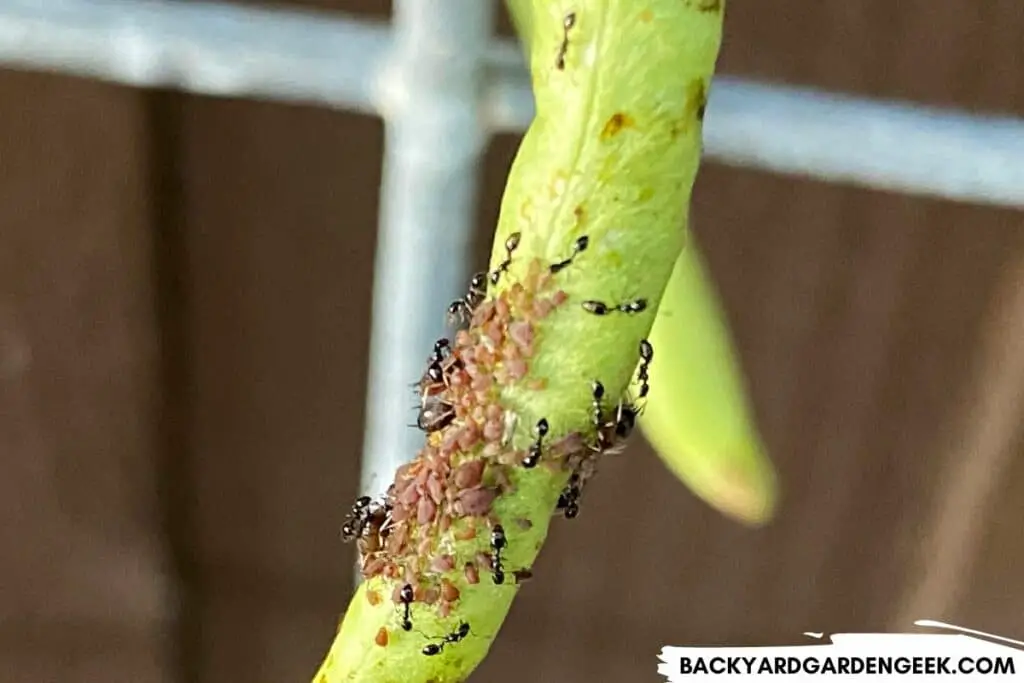
Simply put, ants and aphids have a symbiotic relationship. Ants want to harvest the sugary honeydew droplets that aphids produce while feeding on plant sap, and aphids benefit from the presence of ants, who’ll attack and kill off predatory bugs.
If you’ve got ants among your plants, the odds are against those aphids disappearing on their own since the ants will be protecting and cultivating the aphid colony so that they continue producing the much-desired honeydew.
7. Aphids Can Reproduce Quickly
Unlike insects that pupate, aphids give live birth to their young, and those young come into the world already prepared to give live birth to their own young.
Aphids are a parthenogenetic species, which means that female aphids don’t need male aphids to give birth. They can produce more female aphids on their own.
Newly-birthed aphids will grow into fully-fledged adults in as little as 4 days, and once they’re adults, they can give birth up to 12 times per day given appropriate environmental conditions.
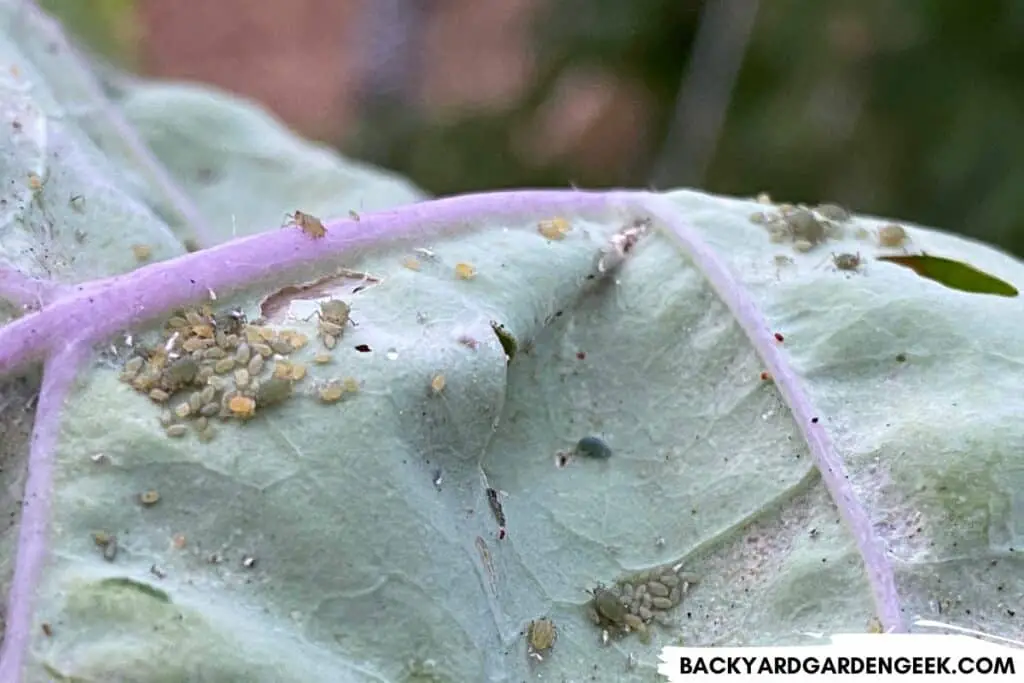
What this means is that aphids can proliferate extensively within 4-6 weeks if they have enough viable food sources nearby.
Unless you’ve got plenty of beneficial predators around your garden, they won’t be able to handle thataphid proliferation, which means your aphid problem won’t necessarily go away on its own.
8. Aphids Will Relocate Out of Necessity
If your aphid problem went away on its own, you might have beneficial predators to thank. But you might also have noticed a natural response as aphids recognized a lack of viable host plants and transitioned away from your property in search of better food sources.
Here’s what happens: When female aphids start to recognize that the colony is outgrowing its food source, they have the ability to give birth to winged that (as I noted earlier) have the ability to move from the original host plant in search of other nearby plants.
Wingless aphids aren’t going to crawl from one plant to the next unless the plants are touching and thus offer a natural land bridge, but aphids can easily produce enough winged varieties to spread their population elsewhere when necessary.
9. Aphids Can Overwinter in Your Garden
Unfortunately, aphids might seem like they disappear when cold weather arrives, but that’s usually not the case.
Aphids have the ability to withstand short bouts of freezing temperatures because they can essentially go into a hibernation-like state where they shut down many of their biological processes in order to conserve energy.
But aphids can live through winter in their eggs as well. In fact, they can withstand freezing temperatures much longer when they’re in their eggs than when they’re clinging to plants.
To be clear, aphid mortality rates are very high during winter as researchers have demonstrated, but enough aphids survive each winter to reappear in spring and begin the infestation process all over again.
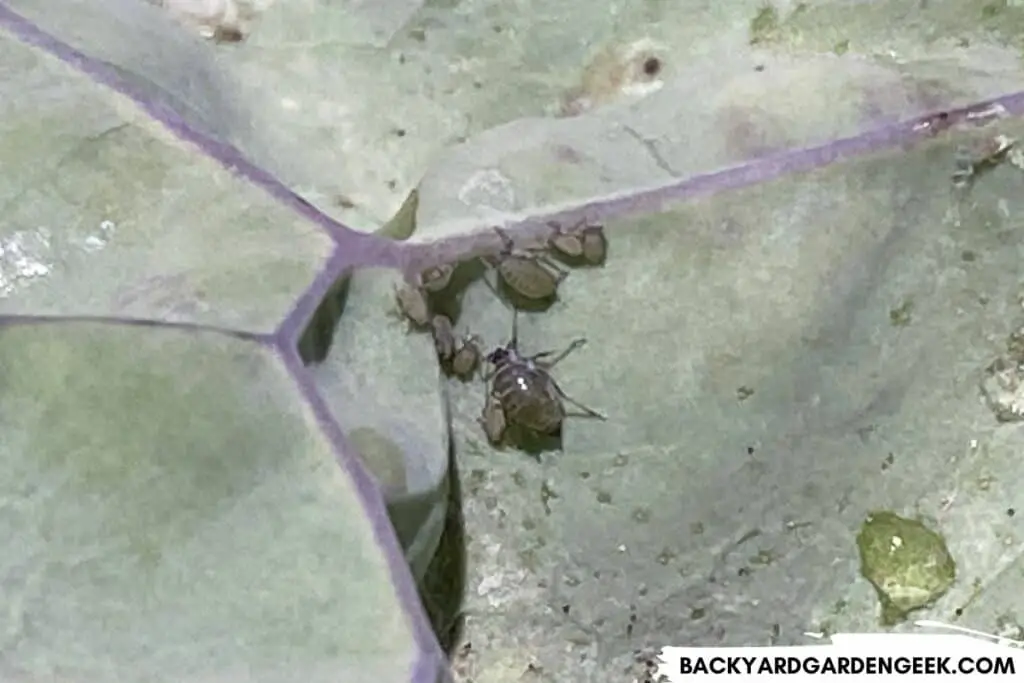
How Long Does It Take for Aphids to Go Away?
As you can imagine, if you leave aphids alone, they may or may not go away on their own.
If they do, you’ll likely have to wait 4-6 weeks to see such results because beneficial predators need time to do their work or because plants will start to get exhausted as an infestation lingers.
Assuming your infestation continues beyond 4-6 weeks, you’re likely not going to see it disappear anytime soon because the aphids have found an environment that they prefer and won’t willingly leave.
In any case, I recommend intervening early whenever you see aphids in your garden.
I’ve had enough experience leaving aphids alone to not be willing to risk that kind of approach any longer.
If you’d like to know the methods I use to stop aphids in their tracks, check out these articles for details about using water, soapy water, and neem oil on aphids:
- 11 Destructive Ways That Aphids Harm Plants
- Can Aphids Survive If Sprayed, Soaked, or Doused with Water?
- Can Plants Recover from Aphids? Tips to Save Your Plants
- Will Rain Wash Away or Get Rid of Aphids? 4 Things to Consider
Why Do Aphids Keep Coming Back?
There are many reasons why aphids will keep coming back to your garden.
Generally speaking, these are the primary reasons why you’ll keep seeing aphids again and again, year after year:
- There are over 4,700 aphid species, and many of them have likely acclimated to your local region and thus established themselves there.
- They’ll eat over 200 different plant species, which means they have preferences for many different plants.
- They’ll reproduce quickly and relocate when necessary, as I’ve noted above.
- They’ll get help from the wind, humans, and animals when it comes to moving from place to place.
- Global shipping is also responsible for spreading aphids across the world, as anyone knows who’s bought plants from a local retailer only to find out that aphids hitched a ride on them.
For these reasons, as well as those I’ve discussed above, aphids are a prolific pest that will keep coming back because there’s so many of them spread across the world and because they’re a resilient species in so many ways.
Additional Info
If you’d like to keep reading aphid-related articles, I recommend taking a look at these:
